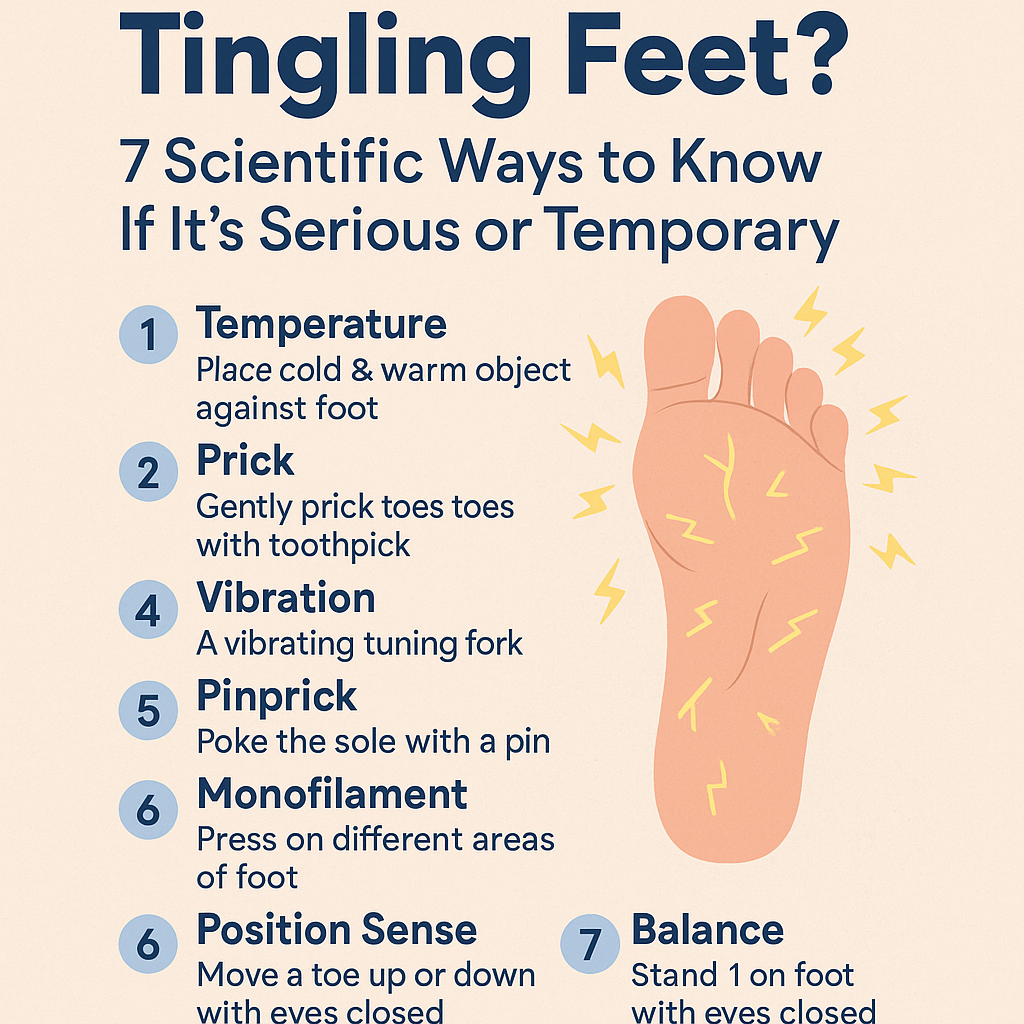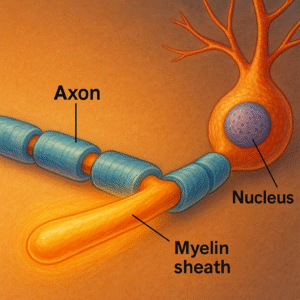
⚠️ Affiliate Disclaimer: This post may contain affiliate links, which means I may earn a small commission — at no extra cost to you — if you make a purchase through one of these links. I only recommend products or services I genuinely trust and believe can provide value. Thank you for supporting My Medical Muse!
Tingling Feet? 7 Scientific Ways to Know If It’s Serious or Temporary
Tingling feet can be unsettling sometimes it’s harmless, other times it’s a sign of something serious like neuropathy, diabetes, or vitamin deficiency. Learn how to tell the difference and what to do next.
Table of Contents:
- 1. What Is Tingling in the Feet?
- 2. Common Temporary Causes of Tingling Feet
- 3. When Tingling in Feet Might Be Serious
- 4. Serious Medical Conditions Linked to Tingling Feet
- 5. How to Diagnose the Underlying Cause
- 6. When to See a Doctor About Tingling Feet
- 7. Natural Remedies and Treatments for Tingling Feet
- 8. Final Thoughts
What Is Tingling in the Feet?
Tingling in the feet also known as paresthesia feels like pins and needles, crawling, or a slight burning sensation. Most people experience this occasionally, like when your foot “falls asleep.” but when it happens frequently, or without an obvious reason, it can be your body’s way of waving a red flag.
This sensation occurs when nerves are irritated, compressed, or damaged. The challenge is figuring out whether it’s temporary and harmless, or the beginning of a more serious health issue.
Common Temporary Causes of Tingling Feet
Not all tingling is serious. In fact, many cases are caused by everyday factors that resolve quickly. Here are some of the most common benign reasons:
- Poor posture or pressure on nerves.
- Sitting cross-legged or in one position for too long can compress the nerves in your legs and feet, causing that familiar “asleep” sensation.
- Temporary circulation issues.
- Cold temperatures or tight socks and shoes may restrict blood flow, leading to tingling or numbness in the toes and feet.
- Vitamin Deficiencies (Early Stage). Even minor deficiencies in vitamin B, especially B12, B6, and B1 can cause nerve-related symptoms, although they often worsen over time if untreated.
- Anxiety or Panic Attacks.
- Hyperventilation during anxiety episodes can lead to tingling sensations in hands, lips, and feet due to rapid shifts in blood gases.
- Side Effects of Medications: Some medications such as chemotherapy drugs, certain antibiotics, or antivirals can temporarily affect nerve function.
When Tingling in Feet Might Be Serious
So how do you know when tingling feet are worth worrying about?
If tingling:
- Lasts more than a few minutes without relief.
- Happens frequently or is worsening over time.
- Occurs with weakness, pain, or muscle wasting.
- Comes with balance problems, vision changes, or slurred speech.
- Is only on one side of your body (suggesting nerve damage or stroke).
then it’s time to take it seriously, these symptoms may indicate nerve damage, systemic illness, or neurological dysfunction.
Serious Medical Conditions Linked to Tingling Feet
Here are some conditions known to cause chronic or serious tingling in the feet:
Peripheral Neuropathy
This is the most common culprit behind long-term tingling feet. It occurs when the peripheral nerves are damaged by injury, illness, or toxic exposure.
Common causes include:
- Diabetes
- Alcoholism
- Chemotherapy
- HIV/AIDS
- Autoimmune conditions (e.g., lupus, Guillain-Barré)
Diabetes (or Prediabetes)
Over time, high blood sugar damages nerves, especially in the feet, a condition called diabetic neuropathy. Tingling, numbness, and burning pain are early signs.
Vitamin B12 Deficiency
B12 is essential for nerve health, a deficiency can cause tingling in the feet, hands, and even balance issues. It’s more common in vegetarians, older adults, and people with digestive disorders.
Multiple Sclerosis (MS)
MS is a neurological condition where the immune system attacks the protective sheath around your nerves. Tingling in the feet or hands can be an early symptom.
Read More: Multiple Sclerosis
Spinal Problems
A herniated disc or spinal stenosis can compress nerves that travel to your legs, leading to tingling, pain, or numbness.
Also Read: Spinal Cord Injuries
Stroke or Transient Ischemic Attack (TIA)
If tingling comes on suddenly, especially on one side of the body and with other neurological symptoms, it could be a warning sign of a stroke.
How to Diagnose the Underlying Cause
If you’ve had persistent tingling in your feet, your doctor will start by taking a detailed history and doing a physical exam. Depending on your symptoms, tests may include:
- Blood tests (to check for diabetes, vitamin levels, thyroid problems, etc.).
- Nerve conduction studies (to measure nerve signal strength).
- Electromyography (EMG) to evaluate muscle and nerve function.
- MRI or CT scan to check for spinal or brain issues.
- Nerve biopsy (in rare, complicated cases).
The sooner the underlying cause is found, the better your chances of recovery.
When to See a Doctor About Tingling Feet
Seek medical attention if you experience any of the following:
- Tingling that doesn’t go away after changing position.
- A burning or stabbing sensation in your feet.
- Numbness that affects your ability to walk or feel pain.
- Sudden onset of symptoms with weakness or vision changes.
- A history of diabetes, B12 deficiency, or spinal issues.
Remember: early diagnosis and treatment can prevent permanent nerve damage.
Natural Remedies and Treatments for Tingling Feet
Depending on the cause, a combination of medical and lifestyle treatments may help ease your symptoms. Here are some approaches that might work:
- Correct Nutritional Deficiencies: Make sure you’re getting enough B-complex vitamins, especially B12, B6, and folate. Supplementation can dramatically reduce nerve symptoms when caused by deficiency.
- Manage Blood Sugar Levels: For diabetics or prediabetics, tight glucose control is essential. Diet, exercise, and medication can all help prevent further nerve damage.
- Anti-Inflammatory Foods and Supplements: Omega-3s, turmeric, and alpha-lipoic acid may reduce nerve inflammation and pain.
- Foot Soaks and Warm Compresses: Warm (not hot) Epsom salt soaks can increase blood flow and relax nerves.
- Gentle Stretching and Yoga: Certain poses can relieve pressure on pinched nerves and promote circulation.
- Avoid Alcohol and Tobacco: Both worsen nerve damage and slow healing. Reducing or quitting these can significantly improve symptoms.
- Physical Therapy: Especially useful when tingling is caused by spinal or muscular issues. PT helps improve posture, flexibility, and nerve flow.
- Medications for Nerve Pain: In chronic cases, doctors may prescribe gabapentin, pregabalin, or certain antidepressants to calm overactive nerves.
Final Thoughts:
Tingling feet might seem minor, but they can be your body’s early warning sign of deeper issues. While some causes are harmless and temporary like sitting too long others, like diabetic neuropathy or vitamin B12 deficiency, can lead to permanent damage if left untreated. The key is to listen to your body, if you notice frequent, worsening, or unexplained tingling in your feet, don’t ignore it. Seek medical advice early with the right care, most causes of tingling can be treated or even reversed.
👩⚕️ Need Personalized Health Advice?
Get expert guidance tailored to your unique health concerns through MuseCare Consult. Our licensed doctors are here to help you understand your symptoms, medications, and lab results—confidentially and affordably.
👉 Book a MuseCare Consult Now

